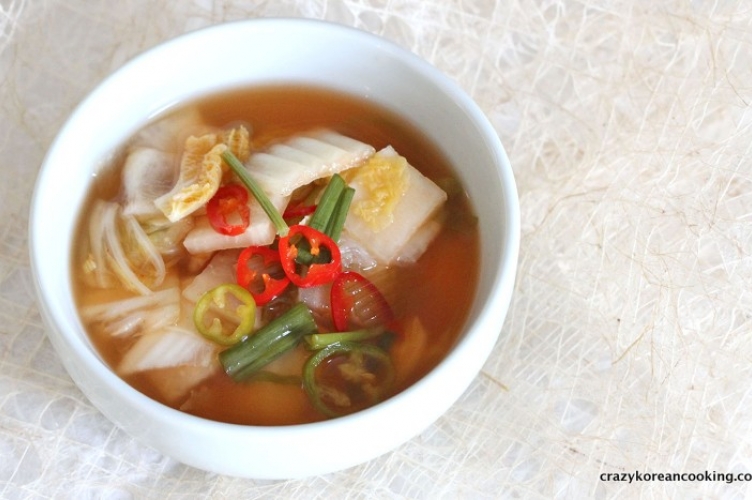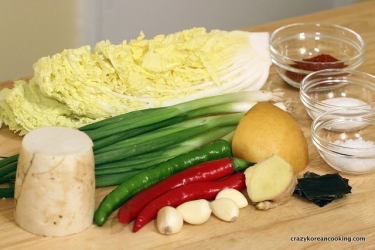Nabak Kimchi (Mul Kimchi), Pink Water Kimchi
나박김치 (물김치)

Nabak Kimchi is a type of traditional Korean Mul Kimchi (water kimchi: kimchi in drinkable broth). The name “nabak” originates from a word describing the thin square-shaped cut of radish used in the dish. Nabak Kimchi can be enjoyed with any meals at any time of the year. But, it is more often enjoyed during spring and summer in Korea. It pairs well with greasy food, grilled meat and grilled fish because of the refreshing broth and the crispy texture of radish and cabbage.
Another common Mul Kimchi (water kimchi) is Dong-chi-mi. Dong-chi-mi is a simpler Mul Kimchi with clear broth and only radish as a main ingredient. Nabak Kimchi is a little more elaborate. It usually includes radish and napa cabbages along with other secondary ingredients like minari (water dropworts), chili peppers, cucumbers and carrots. The broth is pinkish from red chili flakes.
Buy Kimchi ingredients online here.
Nabak Kimchi is a type of traditional Korean Mul Kimchi (water kimchi: kimchi in drinkable broth). The name “nabak” originates from a word describing the thin square-shaped cut of radish used in the dish. Nabak Kimchi can be enjoyed with any meals at any time of the year. But, it is more often enjoyed during spring and summer in Korea. It pairs well with greasy food, grilled meat and grilled fish because of the refreshing broth and the crispy texture of radish and cabbage.
Another common Mul Kimchi (water kimchi) is Dong-chi-mi. Dong-chi-mi is a simpler Mul Kimchi with clear broth and only radish as a main ingredient. Nabak Kimchi is a little more elaborate. It usually includes radish and napa cabbages along with other secondary ingredients like minari (water dropworts), chili peppers, cucumbers and carrots. The broth is pinkish from red chili flakes.
Buy Kimchi ingredients online here.
INGREDIENTS
shop these ingredients online »main ingredients | ||
| 3 oz | Napa Cabbage 배추 (about 300 - 400g) | |
| 2 oz | Korean Radish 무 | |
| 1¼ tsp | Coarse Sea Salt 굵은 소금 | |
| ½ oz | Dropworts 미나리 (optional, use only the stem part) | |
| ¾ | Green Onion 파 | |
| ⅓ | Red Chili Pepper 붉은 고추 (optional) | |
| ¼ | Green Chili Pepper 풋고추 | |
| ⅓ clove(s) | Garlic Clove (whole) 통마늘 | |
| ½ oz | Ginger Root 생강 | |
for red chili flake water | ||
| ⅛ | Korean Pear 배 | |
| 1¾ tsp | Gochugaru, Korean Hot Pepper Flakes 고춧가루 | |
| 3 tbs | Water 물 | |
for main broth | ||
| 1 cup 6⅓ tbs | Water 물 (to yield 6 cups of kelp broth or you can use 6 cups of plain water instead) | |
| ¾ piece(s) | Kelp (dried, 2" X 2" or 5 cm x 5 cm) 다시마 | |
| 1¼ tsp | Coarse Sea Salt 굵은 소금 (may vary depending on the brand of salt) | |
| 1¼ tsp | Sugar 설탕 | |
tools & equipments
-empty tea bag (optional but great to have)

Optional Ingredients and Substitutions
Minari (water dropwort) can be omitted although it adds a very nice flavor and aroma to the dish. If you are using minari, use only the stems. You can use the leaves for pancakes or namul.
Chili peppers can be omitted. Red chili peppers add a great red color which you can substitute with regular red pepper, carrots or chili treads (silgochu). Green chili peppers add a spicy kick.
Cucumber & carrots can be added. Only add a small amount of carrots and cucumbers so they don’t overpower the flavors.
Good to Know
Ginger and garlic in a tea bag:
In this recipe, ginger and garlic are julienned and placed in a tea bag. Then, they are placed in the container. This is a great way to infuse ginger and garlic flavors without any bits floating around in the kimchi broth.
However, if you don’t have a tea bag around, you can just mince garlic and ginger and add them in the broth.
Non-spicy variation
Traditionally nabak kimchi is reddish color from red chili flakes. But, you can leave out red chili flakes and it will still be delicious.
More questions? Please leave your questions below in the comment section. We will do our best to answer as soon as we can.
instructions |
photos |
summary |
|---|---|---|
Ingredient amounts in the recipe instructions are for the default serving size. |
Click to enlarge photos. |
Ingredient amounts in the recipe summary are for the default serving size. |
1. Make kelp brothBring 7 cups of water with 3-4 pieces (2” X 2”) of kelp to boil on high heat. Once it starts to boil, boil for another 10 min on medium heat. *You will need 6 cups of kelp broth later. |
1
Bring to boil High Heat
Boil Med Heat | |
2. Cool down kelp brothRemove kelp from the broth and let it cool on the side. |
2
Remove kelp Cool down broth | |
3. Tear & Wash cabbageTear off leaves from ¼ napa cabbage (about 400g). Wash thoroughly twice under running water and drain. |
3
Tear off leaves Wash twice Drain | |
4. Cut cabbageCut the leaves into bite-sized pieces (1¼” X 1” or 3.5cm X 3cm). |
4
Cut (1¼” X 1” or 3.5cm X 3cm) | |
5. Cut Korean radishPeel, wash and cut 200g of Korean radish into thin squares (1” X 1” X⅛” or 2.5cm x 2.5cm x 0.2cm). |
5
Peel, wash & cut
| |
6. BrineSprinkle 2 tablespoon of coarse sea salt all over the cabbage and the radish. Mix it up. Let it sit for about 30 min. |
6
Sprinkle
on cabbage and radish Let it sit | |
7. Mince pearMince ¼ Korean pear with a grater or a food processor. |
7
MInce ¼ Korean pear. | |
8. Make red chili flakes waterMix 3 tablespoons of of (gochugaru) red chili flakes, minced pear and 1 cup of water. Set it aside to use it later. |
8
Mix
Set aside | |
9. Julienne garlic and gingerJulienne 2 cloves of garlic and x 10 g of ginger. |
9
Julienne 2 cloves garlic 10g ginger | |
10. Place it in a tea bagPlace julienned garlic and ginger in a tea bag and close it. This will be placed the bottom of the container at the end. This allows the flavors of garlic and ginger to be infused during the fermenting process without garlic and ginger bits floating around. See tips for an alternative method. |
10
Place cut garlic, ginger in tea bag | |
11. Place tea bag in containerPlace the teabag with garlic and ginger at the bottom of a clean large container. An ideal container for best tasting nabak kimchi is a long narrow glass container with a lid but you can get away with other types. |
11
Place teabag in container | |
12. Filter red chili flakes waterFilter the red chili flakes water through a fine strainer. |
12
Filter chili water | |
13. Add veggies & chili waterPlace salted cabbages and radishes in the container. Add filtered red chili water. Gently mix it around making sure the tea bag stays at the bottom. Let it sit for 10-20 min to make cabbages and radish more red (optional). |
13
Add to container
Pour filtered chili water Gently mix Let it sit | |
14. Cut green onionsWash and cut green onions into 1” (or 3 cm). |
14
Wash Cut into 1” (or 3 cm)
| |
15. Slice chili peppersThinly slice 2 red chili peppers and 1 green chili peppers. Don’t add green chili peppers if you don’t like a spicy kick. |
15
Thinly slice
| |
16. Season brothMix 6 cups of cooled kelp broth (or just plain filtered water) with 2 tablespoon of sugar and 2 tablespoon of coarse sea salt. Stir until all sugar and salt are dissolved. |
16
| |
17. Add brothAdd green onions and red & green chili peppers to the container. Pour the broth into the container. |
17
| |
18. FermentClose the lid and leave it in room temperature for 1-2 days for fermentation. |
18
Leave out
| |
19. Add minari (optional)After 1-2 days of fermentation at room temperature, wash and cut 60g of minari (water dropwort into 1” (3 cm) long pieces (use only the stem parts of the dropwort) and add them to the nabak kimchi. It is important to add the dropwort after fermenting to avoid a rapid fermentation process. Place the nabak kimchi in the fridge. |
19
Add 60g water dropwort
Keep in the fridge | |
20. ServeAfter it is fermented to your liking, keep it in the fridge. Mix well before serving and serve in a bowl as a side dish. Nanak kimchi tastes best when it is served cold. If it’s too salty, you can add some cold water or ice before serving. |
20
Store in the fridge Mix well Serve |














 10 min
10 min